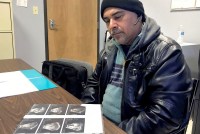Latest KFF Health News Stories
Por qué el cáncer es más peligroso para los inmigrantes en el sur de Texas
En el condado Hidalgo, que incluye a la ciudad de McAllen, y en el de Cameron, ambos sobre el Valle del Río Grande, no hay hospitales públicos. Y el estado no expandió Medicaid.
Cancer Is Especially Dangerous For Immigrants In South Texas. Here’s Why.
When an undocumented immigrant in a Texas border county gets a cancer diagnosis, it can be a death sentence because of a lack of public hospitals.
Crece la preocupación por posible vínculo entre popular herbicida y el cáncer
El glifosato es el herbicida más utilizado en los Estados Unidos, y probablemente en todo el mundo. Se usa en casi cada acre de maíz, algodón y soya cultivados en el país. La marca más popular es Roundup.
Popular Weed Killer’s Alleged Link To Cancer Spreads Concern
The main ingredient in numerous popular herbicides has been implicated by two juries in the cancers of frequent users, but major public health agencies disagree over whether it is a carcinogen. Can you use it safely in your garden? Here are some answers to questions you may have about the weed killer glyphosate.
Cancer’s Complications: Confusing Bills, Maddening Errors And Endless Phone Calls
Carol Marley has pancreatic cancer — and dealing with its financial toll has become her full-time job.
Must-Reads Of The Week From Brianna Labuskes
Newsletter editor Brianna Labuskes wades through hundreds of health articles from the week so you don’t have to.
Trump’s Pediatric Cancer Crusade A Drop In Bucket Compared With Past Presidential Pitches
President Donald Trump wants Congress to allot $500 million over 10 years for pediatric cancer research. While it’s welcomed by researchers and advocates, it’s not a lot of money.
Podcast: KHN’s ‘What The Health?’ A ‘Healthy’ State Of The Union
Health was a featured player in President Donald Trump’s 2019 State of the Union address. The president set goals to bring down prescription drug prices, end the HIV epidemic in the U.S. and cure childhood cancer, among other things. Margot Sanger-Katz of The New York Times, Anna Edney of Bloomberg News and Alice Ollstein of Politico join KHN’s Julie Rovner to discuss these issues and, for “extra credit,” provide their favorite health policy stories of the week. Rovner also interviews KHN senior correspondent Phil Galewitz about the current “Bill of the Month” feature.
Trump Highlights Health Agenda With Vow To Lower ‘Unfair’ Drug Prices
The president laid out a series of goals, including lowering prescription prices, pursuing an end to the HIV epidemic and boosting funding for childhood cancers.
Community Hospitals Link Arms With Prestigious Facilities To Raise Their Profiles
A growing number of community hospitals are forming alliances with some of the nation’s biggest and most prestigious institutions. But for prospective patients, it can be hard to assess what these relationships actually mean.
¿Cuánto cuesta un implante de senos? Depende quién pague…
Un implante de senos por razones cosméticas es mucho más económico que uno que se realiza luego del tratamiento por una enfermedad… ¿Por qué?
One Implant, Two Prices. It Depends On Who’s Paying.
Breast implants — used for both cancer and cosmetic surgeries — give a glimpse into how hospitals mark up prices of medical devices to increase their bottom lines.
Fish Oil And Vitamin D Pills No Guard Against Cancer Or Serious Heart Trouble
And new study finds no reason to get routine vitamin D tests, researchers say.
Píldoras de aceite de pescado y de vitamina D no protegen contra el cáncer o males cardíacos
Los investigadores definieron los males cardíacos graves como el índice combinado de ataques cardíacos, apoplejía y muertes relacionadas con el corazón.
At Death’s Door, Shedding Light On How To Live
When you learn you have a terminal illness, how do you live with purpose and authenticity?
Pricey Precision Medicine Often Financially Toxic For Cancer Patients
Medical treatments targeting the DNA in tumor cells are celebrated, but insurers often won’t cover the skyrocketing cost.
States Act To Safeguard Young Cancer Patients’ Chances To Have Children
Fighting cancer often involves toxic therapies that can cause infertility. In the past couple of years, five states have moved to require that plans pay for services such as egg removal and storage.
Must-Reads Of The Week From Brianna Labuskes
Newsletter editor Brianna Labuskes wades through hundreds of health articles from the week so you don’t have to.
Facebook Live: The Cancer Divide
Californians and Americans are living longer with cancer — but some are living longer than others. California Healthline’s Facebook Live addresses disparities in cancer diagnosis, treatment and care — and what can be done about them.
Must-Reads Of The Week From Brianna Labuskes
Newsletter editor Brianna Labuskes wades through hundreds of health articles from the week so you don’t have to.





















